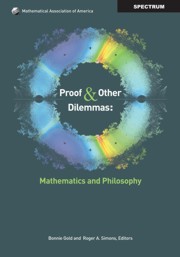Book contents
- Frontmatter
- Contents
- Acknowledgments
- Introduction
- I Proof and How it is Changing
- 1 Proof: Its Nature and Significance
- 2 Implications of Experimental Mathematics for the Philosophy of Mathematics
- 3 On the Roles of Proof in Mathematics
- II Social Constructivist Views of Mathematics
- III The Nature of Mathematical Objects and Mathematical Knowledge
- IV The Nature of Mathematics and its Applications
- Glossary of Common Philosophical Terms
- About the Editors
3 - On the Roles of Proof in Mathematics
from I - Proof and How it is Changing
- Frontmatter
- Contents
- Acknowledgments
- Introduction
- I Proof and How it is Changing
- 1 Proof: Its Nature and Significance
- 2 Implications of Experimental Mathematics for the Philosophy of Mathematics
- 3 On the Roles of Proof in Mathematics
- II Social Constructivist Views of Mathematics
- III The Nature of Mathematical Objects and Mathematical Knowledge
- IV The Nature of Mathematics and its Applications
- Glossary of Common Philosophical Terms
- About the Editors
Summary
From the Editors
This third perspective on proof comes from a mathematician with a more traditional perspective than Borwein's. The author brings his considerable experience both in developing his own proofs and in reviewing others' to questions about the roles of proof. His discussion on the roles of proof contains some interesting new ideas, such as proof as exploration and proof as justification of definitions—ideas that are relevant to us as we think about how we teach mathematics. At the end he offers some extended illustrations of his main points, from his experience working in topological dynamics and ergodic theory.
Joseph Auslander is a Professor Emeritus of Mathematics at the University of Maryland. He has published extensively in topological dynamics and ergodic theory. He is the author of Minimal Flows and Their Extensions (1988) and co-editor, with Walter H. Gottschalk, of Topological Dynamics, an international symposium (1968). He has published two reviews of books in the philosophy of mathematics: What is Mathematics, Really? by Reuben Hersh, Where Mathematics Comes From: How the Embodied Mind Brings Mathematics into Being by George Lakoff and Rafael E. Núñez. Those reviews appeared in SIAM Review (2000) and American Scientist (2001), respectively. With Bonnie Gold, he organized a panel for the winter 2001 joint mathematics meetings in New Orleans on “The Philosophy of Mathematics: That Which is of Interest to Mathematicians,” which led to the founding of POMSIGMAA. He was the first Secretary of POMSIGMAA, and gave a talk, “When is a Proof a Proof?” at the POMSIGMAA contributed paper session in January 2004.
- Type
- Chapter
- Information
- Proof and Other DilemmasMathematics and Philosophy, pp. 61 - 78Publisher: Mathematical Association of AmericaPrint publication year: 2008
- 3
- Cited by

